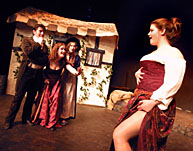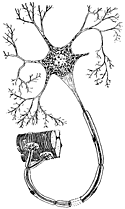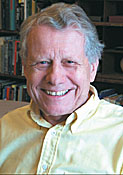On campus
Naughty baronets
 Scene from the Savoy Society's production of Ruddigore
Scene from the Savoy Society's production of RuddigorePhoto: Owen Egan |
|
Mocking the valour of the French had been an Anglo sport long before "Freedom fries" became the side dish of choice in American eateries. As proof, take in the Savoy Society's production of Ruddigore, or "The Witch's Curse," which features a ballad that proclaims "But to fight a French fal-lal -- it's like hittin' of a gal -- It's a lubberly thing for to do."
Of course, the Gilbert and Sullivan tune was satirizing British braggadocio, not French frailty. It's just one of several surprises in one of the duo's lesser-known works.
Director Kersti Kass said that the play satirizes Victorian mores, especially restrictive ideas of women's roles in society. The odd plot revolves around Rose Maybud, an etiquette-obsessed lass who is the object of affection of one Robin Oakapple. The good news? Oakapple is secretly a Baronet. The bad news? His line is cursed to commit a heinous crime every day. Poor etiquette indeed.
"The characters are funny and at times ridiculous, but doesn't this make them more human?" said Kass.
Although long considered to be one of Gilbert and Sullivan's less successful operettas, it did remarkably well in its initial run -- this despite a letter-writing campaign from the French theatre establishment defending their glorious naval tradition. Will Robin woo Rose? Will the curse on his family be lifted? Will all be resolved by the end of Act II in time for the rousing finale of "When a man has been a naughty baronet?"
All these questions and more will be answered in Moyse Hall on March 6-8, 13-15, and 20-22 at 8 pm, with Saturday matinees on the 15 and 22. Tickets are $15/$10 for students/seniors and can be reserved online at www.savoy.ca
Spotlight on Islamic movements
Building hospitals. Feeding the hungry and providing homes to the homeless. Sounds like the activities of the Red Cross, or perhaps Medicins Sans Frontiers. Actually, it falls into the scope of activities practiced by Hezbollah, a Lebanese organization recently added to Canada's terror list.
Islamic movements are far more complex than suicide bombers and terror attacks. Exploring the roots and nature of these movements in the Middle East is the goal of a round table discussion at the Centre for Developing Studies.
"It's important that people know what Islamic movements are about, why they're springing up in the Middle East and why people are clinging to them for hope," explained co-organizer Fariba Dashtgard. The movements do not come out of nowhere, nor are they solely motivated by blind hatred. As a case in point, John Ashfour, former director of the Canadian Arab Federation, will discuss the history of the Hezbollah.
"You can make a direct correlation between the worsening of the economy and politics in Lebanon and the rise of Islamic fundamentalism. And that's happening more and more in Middle Eastern countries."
Dashtgard said that she hopes that people will come prepared to discuss and challenge Western ideas about Islamic movements.
"The preconceived idea is that all Islamic movements are all about Jihad, about violence, and that to a large extent is not true. For instance, in Hezbollah, the social wing provides a lot of social assistance to Lebanese and Palestinian refugees -- hospitals, housing and education. That is often is overlooked. Canada has recently added Hezbollah to its list of banned terrorist organizations. That ignores that the organizations primary goal is to provide those sorts of services."
Dashtgard points out that the combination of militant and social organizations is not unique to Islamic movements -- the African National Congress had the same dichotomy in South Africa.
The event will also feature talks on U.S. foreign policy and Islamist mobilization, the impact of Islam on women in Iran, an examination of Islamism and identity politics, and how Islamic politics have affected the electoral success of Hezbollah.
Contemporary Islamic Movements in the Middle East, March 12 at 4:00 pm, CDAS, 3715 Peel.
Architect at issue
 |
|
Norbert Schoenauer has already left plenty to posterity -- architecture books and articles, a host of students, admiring colleagues, even a town in northern Quebec. Now ARQ La revue d'Architecture has devoted an entire issue to a celebration of the former McGill professor of architecture.
The Hungarian born Schoenauer immigrated to Canada in 1951 and received his M.Arch from McGill in 1959. He taught at the school from the following year until his death in 2001. ARQ #122 serves as a eulogy and a appreciation and an assessment of his work.
Articles were contributed by those who had worked with Schoenauer professionally, as academics and as students. The issue was edited by David Theodore, a former colleague of Schoenauer in the school of architecture.
"He liked to call himself an urban animal, one who cherished the complex layering of the city, and who abhorred the simplified homogeneity of suburbia," writes Theodore in his introduction.
Despite the personal tone of the articles -- many of the writers were friends and admirers of Schoenauer's -- the first article by urban planning professor Jeanne Wolfe is an assessment of Schoenauer's largest project. This was the construction of the mining town of Fermont, a community expressly designed to work with the harsh natural environment of the north.
"A portrait of Norbert Schoenauer" ARQ #122 will be launched March 10, 5 pm, in the exhibition room of the MacDonald-Harrington building.
Grow your brain
 |
|
The psychology department's Hebb lecture series will bring renowned neuroscientist Charles Gross to speak on March 7. The topic of his talk is "Adult Neurogenesis: Death of a Dogma."
Karim Nader, chair of the Hebb lecture committee, said that Gross will be addressing the long-held belief that the brain is incapable of developing new neurons beyond the age of a few months.
"He was invited because he was instrumental in turning around our view of how the brain worked," said Nader.
The Princeton psychology professor's normal research areas are in the fascinating field of "blindsight," the ability to respond to visual information in the absence of conscious awareness of visual perception. He has also written a history of neuroscience that traces the development of the discipline from the time of the Pharaohs.
Nader explained that the idea that the adult brain can develop new neurons is revolutionary for research and treatment of neurological disorders and injuries.
"They don't grow very fast, but they could help in recovery from brain injury or diseases like Parkinson's," he said.
So does this mean we can cast aside all the warnings we've heard about killing our brain cells with TV and pub nights? Not a good idea, said Nader.
"You never want to kill a brain cell -- you can only push a system so far."
Dr. Charles Gross will be speaking on "Adult Neurogenesis: Death of a Dogma" on March 7, 3 pm, Rm. S1/3 in the Stewart Biology Building.
Millennial universities
 American sociologist Charles Tilly will be speaking at the Millenium Conference
American sociologist Charles Tilly will be speaking at the Millenium Conference |
|
If the proper study of mankind is man, than the proper study of universities these days seems to be universities. Hot on the heels of Bernard Shapiro's Evolving University farewell symposium comes the Millennium Conference, the brainchild of Abigail Shorter, a political science graduate student completing her master's degree in Public Administration and Public Policy at Concordia Univer-sity.
Shorter said the Millennium conference will be bringing together policy experts, researchers, and educational leaders to discuss the challenges of the modern university. Panel discussions will address public policy and higher education, technology and university administration, research and private interests.
"Each panel has a policy writer, an academic and a university administrator," said Shorter.
The keynote speaker will be American sociologist Charles Tilly, whose work focuses on large-scale social change. He will be providing the context for the event in his address on the history and role of the university in society.
"Tilly is really a conference by himself," said Shorter, "We're very happy he's coming -- he wouldn't come if he wasn't interested in the topic."
In addition to Tilly, other speakers include Concordia Rector Frederick Lowy, journalist and policy consultant Ann Finlayson, and McGill philosophy professor Mario Bunge.
The Millennium University Conference will be held March 14 and 15 at both Concordia and McGill. For a schedule of events see millennium.concordia.ca.

